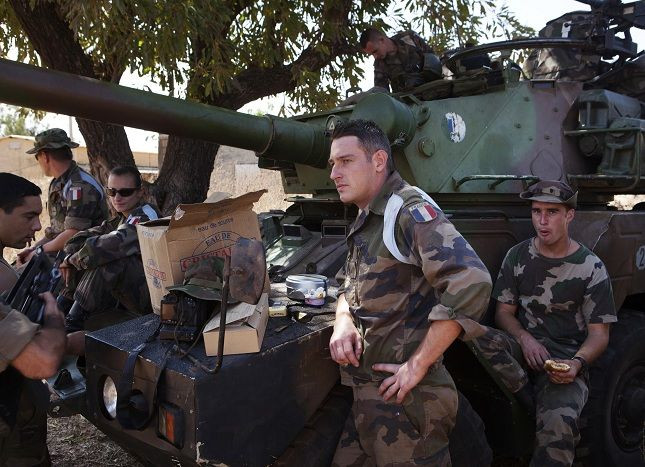French Boots On The Ground For Direct Combat With Islamists In Mali

European boots, tanks and trucks are now on the ground in the West African country of Mali, where militant insurgents have been in control of the northern regions for months and recently began making gains further south.
French President Francois Hollande surprised the international community on Jan. 11 when he announced that French forces had been deployed to Mali; French Foreign Minister Laurent Fabius said the troops were launching airstrikes against the insurgents.
Now, the New York Times reports that direct combat may currently be underway between ground troops and militant rebels.
Fabius, who once predicted that the offensive would be over in a matter of weeks, seemed less certain of the time frame on Wednesday on France’s RTL Radio.
“We’re in a better position than last week, but the combat continues, and it will be long, I imagine,” he said, adding that “now the French forces are reaching the north.”
That signifies that the French, who intervened quite suddenly and sparked widespread speculation as to the extent of their commitment in Mali, might go beyond a simple defense mission to protect the south and turn their attention to the entrenched militant insurgency in the vast, sparsely populated north.
Mali, which had enjoyed relative stability under a democratic system since 1992, was disrupted when insurgents from the Sahel -- a band of semi-arid land just south of the Sahara desert -- rolled into northern towns including Gao, Kidal and Timbuktu. Strengthened by weapons they had gained while fighting as mercenaries for the doomed regime of Moammar Gadhafi in Libya the year before, the invaders were able to overpower the endemically weak Malian army.
Islamists quickly asserted themselves in the north -- an area roughly the size of France itself -- and imposed a harsh version of Shariah, or Islamic law, on communities there. Some of the Islamist groups have links to al Qaeda, and the international community grew increasingly alarmed as northern Mali turned into a safe haven and training ground for militants.
Meanwhile, in Mali’s southern capital city of Bamako, an interim government is still in shambles after mutinous army members overthrew the civilian administration in March.
Islamist militants pushed further south than ever before last week and were apparently headed for the central town of Mopti when French air forces moved in. The United States, Germany, Canada and the United Kingdom have pledged logistical support for France’s offensive, though all stopped short of actually offering any troops.
Regional troops under the banner of the Economic Community of West African States have begun to arrive in Mali to help defend Bamako. They had been planning their own offensive, which was not expected to materialize until autumn, but France’s presence has accelerated their timeline.
Hollande has continued to defend his troops’ presence, noting that Bamako officials had asked for French intervention and that humanitarian crises in the north demanded immediate action. But as France’s footprint gets even bigger with the onset of ground warfare, questions remain regarding the true scale and future scope of France’s involvement.
Hollande said at a press conference on Tuesday that he did not anticipate a long mission in Mali, but the ambitious goals he laid out for the operation suggest otherwise.
“France has no intention of staying in Mali,” he said, according to France 24. “But we have an objective, that is when we leave there should be security in Mali, a legitimate authority, an electoral process and no more terrorists threatening the integrity of the country.”
© Copyright IBTimes 2024. All rights reserved.






















